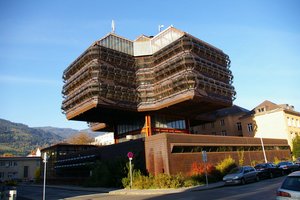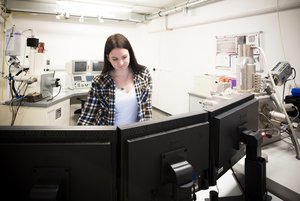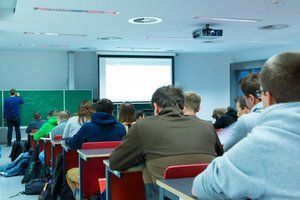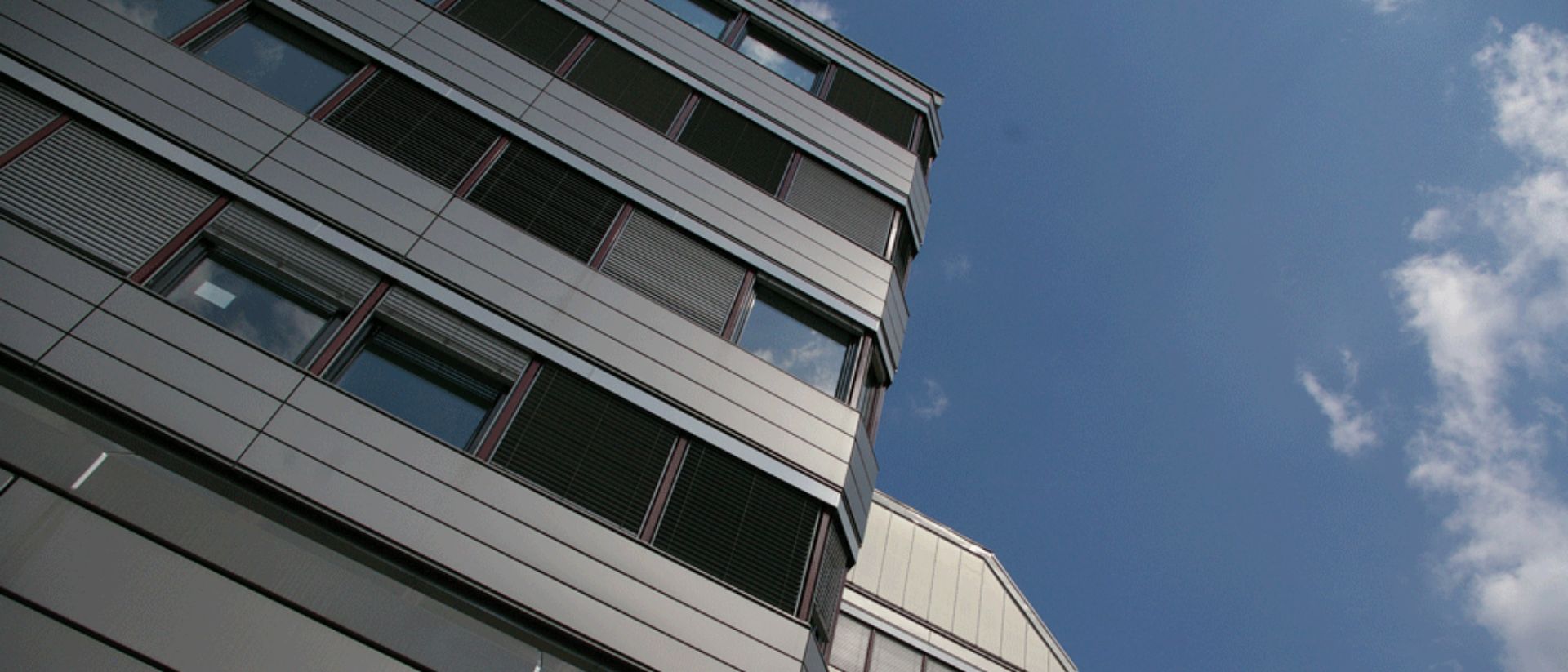From elective to centre of excellence
Historical development of the Department of Polymer Engineering at the University of Leoben
Leoben's plastics technology can look back on five eventful decades. The importance of this new branch of industry was recognised early on at the University of Leoben and the foundation stone for the field of study was laid in the 1967/68 academic year with the establishment of the elective subject "Plastics Technology" in the examination subjects of the Metallurgy course.
This development was preceded by numerous far-reaching events in the Austrian plastics industry, such as the founding of the Association of Austrian Plastics Processors VÖK and of the Laboratory for Plastics Technology LKT.
Emergence of the Polymer Engineering and Science degree programme
at the University of Leoben
After long and active preparatory work on 10 July 1969, the last session of the National Council before the summer break officially decided to found the study programme, and teaching was to officially start as early as the 1969/70 winter semester.
In this context, the following should be expressly noted: Although the relatively early establishment of the degree programme Polymer Engineering and Science at the University of Leoben - as far as is known the first in Europe - was largely triggered by the pressure of decreasing new student enrolments, it was at the same time, as it may well be stated, a very far-sighted step. The establishment of polymer engineering alongside the classical mining sciences was, as the ongoing and subsequent development at that time showed, fully in line with the general scientific and thus also international trend towards the formation of superordinate materials engineering sciences and corresponding clusters of related individual disciplines.
(Günter B. L. Fettweis, in: 40 Years of Department of Polymer Engineering and Science in Leoben)
As early as November 1969, the first Leoben Concerence on Polymer Engineering and Sciencewas held at the university, with Prof. Herman F. Mark as keynote speaker.1
Development of the study program Polymer Engineering and Science
in the period 1970 to 1990
With the start of the study programme Polymer Engineering and Science, an important step was taken in the development of the research focus at the University of Leoben towards modern materials technology and industry. The diploma programme consisted of two sections with a total of ten semesters. The spectrum of teaching included mathematics and descriptive geometry, physics and technical mechanicsm, chemistry and plastics chemistry, mechanical and electrical engineering, economics and business administration, technology and processing of plastics, testing of plastics, design and construction in plastics and composites, as well as numerous electives.
With the four main compartments
- Chemistry of Polymeric Materials
- Designing Plastics and Composite Materials
- Materials Science and Testing of Polymers
- Processing of Composites
the 4-pillar model, which is still successful today, was already designed in these early days and represents a unique selling point of the polymer technology course in Leoben compared to similar courses in other countries.
Development of the Chairs
Initially, two chairs were started: Oberregierungsrat Dipl.-Phys. Dr.rer.nat. Jan Koppelmann took up his duties as full professor for "Chemical and Physical Technology of Plastics" in Leoben on 1.10.1971. On 3.1.1973, private lecturer Dipl.-Phys. Dr. rer. nat. Werner Knappe began his service as full professor for "Plastics Processing" in Leoben.
At the end of the eighties and the beginning of the nineties, plastics technology was increased from two to four institutes. Prof. Günther R. Langecker took up his post in Leoben on 1.7.1989 as the successor to Prof. Knappe. In accordance with a decree of the Ministry of Science of 3.7.1989, the Institute for Chemical and Physical Technology of Plastics was divided. In this way, the Institute for "Chemistry of Plastics", which had been applied for since 1972, was established under the direction of Ao.Univ.Prof. Dr. Klaus Lederer. In May 1991, O.Univ.Prof. Dipl.Ing. Dr.mont. Reinhold W. Lang (Ph.D.) took up his post as successor to Prof. Koppelmann in the Institute for "Materials Science and Testing of Polymers" after the chair had been vacant for about three years. A little later, in July 1991, O.Univ.-Prof. Dipl.-Ing. Dr. techn. Rudolf Wörndle began to set up the new institute for " Designing Plastics and Composite Materials".
In the academic ceremony at Christmas 1975, the first seven graduates were awarded degrees in polymer engineering. In the summer term of the 1979 academic year, another eight graduates followed. All graduates were able to take advantage of good job offers from industry.
The cooperation of companies in the provision of work experience and places for diploma theses was very valuable for the development of the plastics technology field of study. In addition, many companies made themselves available for excursions. The first one-week excursion jointly organised by the institutes led to companies in the Federal Republic of Germany, to Coperion Werner & Pfleiderer GmbH & Co. KG, Stuttgart; BASF AG, Ludwigshafen; Römmler GmbH, Groß-Umstadt; KraussMaffei Technologies GmbH in Munich.2
Development from 1990 - 2010

After the expansion to four institutes of the Department of Polymer Engineering and Science the most pressing question was probably that of space. With all four chairs filled and space allocated, by the end of 1991 the institutes had a total area of 2,386 m² (755 m² office space and 1,631 m² laboratory and pilot plant space) and were spread over several buildings on campus. The discussion about a new building for the department began as early as October 1989, but concepts that had emerged for a new building could not be realised due to falling student numbers and very tight budgets.
Everything under one roof
In 2008, the starting signal was finally given for the "Centre for Polymer Science" project; the plastics technology institutes were to find their new home in the former research and computer centre of the Österreichisch-Alpine Montangesellschaft. The research centre, affectionately known as the Rostschwammerl, opposite Gärnerpark and behind the so-called Residenz, was to be completely renovated and expanded to provide enough space for all the institutes with office, storage and technical centre areas, all under one roof. On 27 April 2010, the Centre for Polymer Technology Leoben was officially opened in Otto Glöckel-Straße. In this competence centre for polymer sciences at the University of Leoben, more than 100 plastics engineers work and conduct research on more than 6,000 m².
This mammoth project included the renovation of the outer façade with grey aluminium sheet panels, the addition of a fourth floor and numerous other structural changes. Shortly before Christmas 2009, the first machines and equipment were moved from the old Technika, in mid-April 2010 the first offices were occupied and on 27 April 2010 the official handover of keys took place at a large opening ceremony with numerous prominent guests, including Federal Minister Dr. Beatrix Karl, BGM HR Dr. Matthias Konrad and Provincial Councillor Mag. Kristina Edlinger-Ploder. At the end of June 2010, the remaining parts of the building were finally completed and occupied.
With the merger of the plastics technology institutes into the Department of Plastics Technology and the establishment of the professorships for Processing of Composite Materials headed by Univ.-Prof. Dipl.-Ing. Dr.-Ing. Ralf Schledjewski and Injection Moulding of Plastics headed by Univ.-Prof. Dr.mont. Walter Friesenbichler, the space situation in the building was also adapted. With new research topics, new equipment and machines are constantly being acquired. Currently, around 130 employees are researching and working at the Centre for Plastics Technology (01 January 2020).3
The Polymer Competence Center Leoben PCCL
In 2000, preliminary considerations and talks began on the application for a Kplus Polymer Competence Centre at the University of Leoben. After extensive preliminary work, in 2001, on the initiative of Prof. Lang, the application for foundation was submitted to the then "Technologie Impulse Gesellschaft mbH" (today FFG). The foundation was approved and the PCCL started its first four-year funding period in July 2002 with almost 40 partner companies and was based in Leoben as a Kplus centre with two branch offices in Graz and Linz. The scientific partners of PCCL-K1 are institutes of the University of Leoben, the Graz University of Technology, the Vienna University of Technology as well as Joanneum Research Forschungsgesellschaft mbH (Graz) and the Transfer Centre for Plastics Technology (Wels). Numerous scientific cooperations with international partner institutes complement the competence profile of PCCL-K1. The approx. 40 partner companies of the PCCL-K1 include national and international firms.
Due to the successful development of the PCCL in the first funding period and the many ongoing research projects at the institutes for plastics technology and science, the topic of space has become more urgent than ever. In 2005, the University of Leoben planned a 7,790 m² Impulse Centre for Materials (IZW) to the west of the Voest Research and Computer Centre. This building was to house the two Kplus competence centres MCL and PCCL as well as three of the four polymer institutes with their laboratories and pilot plant areas and was to be completed at the end of August 2007.4
From the turn of the millennium until today



In 1999, 29 European education ministers signed the Bologna Declaration in Bologna, Italy, which is not binding under international law, a political project to create a unified European higher education system by 2010. The education ministers of the participating nations decided to introduce a consecutive, two-tier system of degrees usually referred to as "Bachelor's" and "Master's". The main objectives of this process were to promote mobility, international competitiveness and employability. To this end, a system of easily understandable and comparable degrees was to be created and a system for transferring study credits, the European Credit Transfer System (ECTS), was to be introduced.
Tripartite curriculum
As a preliminary stage to the introduction of the two-tier study system, a new curriculum for Polymer Engineering and Science was adopted in 2000, which on the one hand provided for a decluttering of the curriculum and on the other hand already had a structure that could be quickly converted into a Bachelor's and Master's programme if required. The original structure with two study sections of 5 semesters each was changed to a three-stage procedure with 4+3+3 semesters.
The first part of the study programme had the task of introducing the students to the study programme and to develop the scientific and technical basics.The second part of the study programme served to deepen the education. The third part of the study programme served to further deepen the subject and the special scientific professional training in the vie pillars of the study programme; in addition, a diploma thesis had to be written.
Bachelor's and Master's degree
After there were already two fields of study at the University of Leoben that had decided to convert to the new Bachelor's and Master's degrees ("Metallurgy" and "Industrial Environmental Protection, Waste Disposal Technology and Recycling"), the study commission for plastics technology also decided in April 2003 to convert the diploma degree programme to a Bachelor's and Master's degree programme. The 4+3+3 semester structure at that time and the course work introduced at the beginning of the study programme facilitated the conversion to Bachelor's and Master's degrees.
In 2015, a major redesign of the degree programme was necessary. On the one hand, the unusual semester division (7+3) for the Bachelor's and Master's degree programme was not compatible with the international standard of 6+4, which made a student exchange in both directions (incoming and outgoing) difficult. On the other hand, a legal loophole regarding compulsory internships had to be closed. Since the internship is a compulsory part of the degree programme and must be completed by every student, credits must also be awarded for this workload, which was not taken into account in the previous curricula. In addition, there was an imbalance between the Bachelor's and Master's programmes in terms of study load with the heavier workload in the Bachelor's programme, which made it almost impossible to complete the Bachelor's degree in a reasonable time frame. To address these problems, the following two measures were taken:
- The semester division was changed in principle to 6+4 and thus some courses were shifted from the overcrowded Bachelor's programme to the Master's programme.
- The internship was completely shifted to the Bachelor's programme and thus also reduced from 6 to 4 months (80 days), which corresponds to 30 credits. In order to fit these additional 30 credits into the Bachelor's programme, an additional 7th semester had to be formally added. Since the internships are still usually completed during the semester breaks, it is still theoretically possible to complete the courses of the Bachelor's programme within 6 semesters, as is intended for international compatibility.
In addition to these major changes in the curricula, the study programme has been expanded, especially in the elective subject groups, which is mainly due to the two new institutes, but also to a general further development and expansion of the course programme of all other institutes on current topics in polymer science and industry. In order to take into account the increasing internationalisation, many of the existing and most of the new electives are now offered in English. On the one hand, this makes Leoben more attractive for incoming students without German language skills, and on the other hand, it also better prepares our own graduates for professional life in an increasingly global working world.5
Quellen:
1 Günter B. L. Fettweis; in: 40 Jahre Kunststofftechnik Leoben
2 Albert F. Oberhofer; in: 40 Jahre Kunststofftechnik Leoben
3 Stephan Schuschnigg; in 50 Years POLYMER ENGINEERING AND SCIENCE at Montanuniversität Leoben
4 Walter Friesenbichler; in 50 Years POLYMER ENGINEERING AND SCIENCE at Montanuniversität Leoben
5 Thomas Lucyshyn; in 50 Years POLYMER ENGINEERING AND SCIENCE at Montanuniversität Leoben
